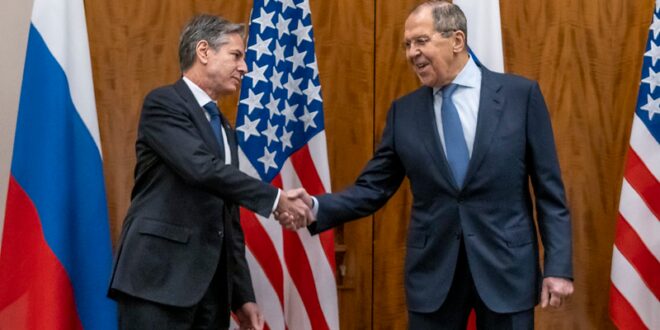U.S. Secretary of State Antony Blinken reiterated after meeting Friday with Russian Foreign Minister Sergey Lavrov in Geneva that the United States and its allies are ready to respond to a Russian invasion of neighboring Ukraine.
“If any of Russia’s military forces move across the Ukrainian border, that’s a renewed invasion. It will be met with a swift, severe and a united response from the United States and our partners and allies,” Blinken told reporters after the meeting.
The West is demanding that Russia pull its troops and weapons away from the Ukraine border while Moscow is pushing for NATO to curtail its operations in eastern and central Europe and insisting that the Western military alliance reject Ukraine’s membership bid.
The two senior diplomats met for 90-minutes, the fourth time in recent days that U.S. and Russian officials have engaged in direct talks. Prior to the talks, each side said it expected no breakthroughs.
Blinken said the U.S. and its allies are prepared to address Russia’s concerns but warned they would not yield on the issue of defending Ukraine in the event of a Russian invasion.
“I stressed again to Mr. Lavrov that on the security concerns that Russia has raised in recent weeks, the United States, our allies and partners are prepared to pursue possible means of addressing them in a spirit of reciprocity, which means simply put that Russia must also address our concerns,” Blinken said.
“There are several steps we can take, all of us, Russia included, to increase transparency, to reduce risks, to advance arms control, to build trust,” Blinken added.
Speaking at a news conference after the meeting, Lavrov said it was “constructive and useful” and again denied Russia has intentions of invading Ukraine, while it seeks security guarantees, such as Ukraine not joining NATO, the seven-decade-old military alliance formed after World War II.
Blinken said the U.S. and its allies are unconvinced of Lavrov’s insistence that Russia does not plan to invade Ukraine, saying “We’re looking at what is visible to all.” Blinken urged Moscow to pull back its troops from the border to prove its assertions.
Lavrov noted that Ukraine is receiving assistance from western nations, including weapons deliveries from Britain.
“No one is hiding the fact that weapons are being handed over to Ukraine; that hundreds of military instructors are flocking to Ukraine right now,” Lavrov said.
Lavrov also said talks would continue over Russia’s security demands, that he expressed hope to Blinken that emotions would cool down over Ukraine, and that Russian President Vladimir Putin stands ready to communicate with U.S. President Joe Biden.
Blinken said his meeting with Lavrov was “not a negotiation, but a candid exchange of concerns and ideas.”
“I made clear to Mr. Lavrov that there are certain issues and fundamental issues that the United States and our partners and allies are committed to defend,” Blinken said. “That includes those that would impede the sovereign of Ukranian people to write their own future.”
Blinken said he and Lavrov agreed to put the concerns they discussed in writing and have follow-up conversations after each country has reviewed them. He said if the countries’ foreign ministries consider it useful, arrangements would be made for Biden and Putin “to talk, to engage to try to carry things forward.”
“I think we’re fully prepared to do that,” Blinken added.
On Thursday, after meeting with German Foreign Minister Annalena Baerbock in Berlin, Blinken said Putin has a choice between “dialogue and diplomacy on the one hand and conflict and consequences on the other hand. He has to decide which course to take.”
Blinken said, “We’re at a decisive juncture,” referring to the standoff between Western countries and Moscow over Putin’s massing of 100,000 troops along Ukraine’s eastern flank.
While the U.S. has been resolute in saying that a Russian military invasion of Ukraine would draw swift and significant economic sanctions, but no U.S. or NATO military response, it has been less clear what the West might do in the event of Russian cyberattacks or other actions against the Kyiv government.
At his news conference Wednesday, U.S. President Joe Biden made confusing remarks about the West’s response to what he called a “minor incursion.”
White House press secretary Jen Psaki later said Biden “knows from long experience that the Russians have an extensive playbook of aggression short of military action, including cyberattacks and paramilitary tactics. And he affirmed today that those acts of Russian aggression will be met with a decisive, reciprocal, and united response.”
Biden’s comment about a “minor incursion” drew a sharp retort from Ukrainian President Volodymyr Zelenskiy, who said on Twitter, “We want to remind the great powers that there are no minor incursions and small nations. Just as there are no minor casualties and little grief from the loss of loved ones. I say this as the president of a great power.”
Biden hedged on whether Putin will invade Ukraine, saying, “I’m not so sure he [is] certain what he’s going to do. My guess is he will move in. He has to do something.”
The U.S. leader said he does not believe Putin wants a “full-blown war” but does want to test the resolve of the United States and NATO.
 Eurasia Press & News
Eurasia Press & News




